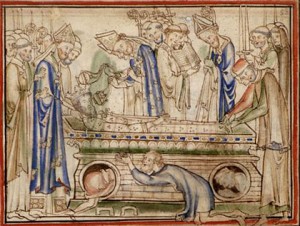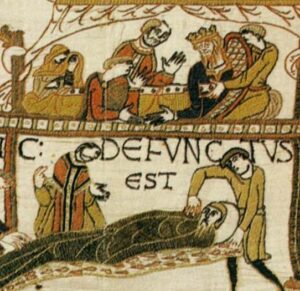
We think of King Edward as an old man by 1066, and I suppose by 11th century standards, 63 years of age was getting on there. However, his health declined so precipitously the previous month that Duke William of Normandy was caught unawares, and by the time the Normans got the news, Harold was crowned as a fait accompli.
It was thought by many that Edward’s sudden illness was caused by the revolt of the Northumbrians in October of 1065. This rebellion resulted in the enforced exile of his favorite, Tostig, and the King’s realization that his commands were ineffectual. Edward wanted to call up the fyrd and compel his rebellious subjects to capitulate and accept Tostig back. Alas, because of the lateness of the year and the general abhorrence for civil war, he couldn’t gather enough support for this course of action. Even Harold was unwilling to cooperate, and Edward was obliged to accept the Northumbrians’ terms and acknowledge Morkere as their new Earl, even though their hastily called election was illegal. It was thought that Edward was so humiliated that he suffered a number of strokes as a result.
Whether or not this was the true cause of Edward’s decline, he was noticeably ill by Christmas Eve. He managed to stumble through the next couple of days but took to his bed on the 28th of December, unable to attend the consecration of his great Westminster Abbey. For the next week, he slipped in and out of unconsciousness, but rallied enough to give a long and drawn-out account of a dream he had, predicting the fall and misery of England. It was said that Archbishop Stigand whispered to Harold that this was the babbling of an old man worn out by sickness.
 More to the point, the moment had come where Edward was to declare his heir. As with just about everything else, no one knows exactly what happened. If we take the Bayeux Tapestry literally, there were only four witnesses: Queen Editha, Harold, Archbishop Stigand, and Robert the Staller, Edward’s Norman friend who held the King in his arms. It is possible (and I think probable) that there were other witnesses. Nonetheless, the King was apparently conscious and alert by now, and he addressed the Queen, who he compared to a beloved daughter. Then, according to the Vita Aedwardi Regis, he stretched his hand to Harold and said, “I commend this woman and all the kingdom to your protection.” He exhorted Harold to care for her and any Normans who chose to stay, or give safe conduct to those who decided to leave. Perhaps wisely, he also commanded that they announce his death at once, so the people could pray for him. Did he fear that Harold would keep his death a secret so he could properly arrange for the succession?
More to the point, the moment had come where Edward was to declare his heir. As with just about everything else, no one knows exactly what happened. If we take the Bayeux Tapestry literally, there were only four witnesses: Queen Editha, Harold, Archbishop Stigand, and Robert the Staller, Edward’s Norman friend who held the King in his arms. It is possible (and I think probable) that there were other witnesses. Nonetheless, the King was apparently conscious and alert by now, and he addressed the Queen, who he compared to a beloved daughter. Then, according to the Vita Aedwardi Regis, he stretched his hand to Harold and said, “I commend this woman and all the kingdom to your protection.” He exhorted Harold to care for her and any Normans who chose to stay, or give safe conduct to those who decided to leave. Perhaps wisely, he also commanded that they announce his death at once, so the people could pray for him. Did he fear that Harold would keep his death a secret so he could properly arrange for the succession?
Were his words really so ambiguous? It’s curious that the venerable Edward A. Freedom chose to interpret the statement as “To thee, Harold my brother, I commit my Kingdom” and justified his decision in a footnote. Edward could just as easily have been assigning the regency to Harold rather than the crown, but obviously Harold chose the latter. Interestingly enough, most contemporary documents—even those from Normandy—seem to accept that the King had declared Harold his heir.
It is possible that Harold brought the issue to the Witan that very night, since the following day saw both a funeral and a coronation at Westminster Abbey; I don’t see how there could have been time for a Witenagemot in between the two ceremonies. Without the Witan’s approval, Harold’s kingship would have been unlawful. King Edward’s wishes were secondary, and everybody knew it (except, perhaps, for Duke William). In times of trouble, the country needed a strong hand at the helm and Harold had proven himself a good administrator and a formidable warrior.
william crump says:
You mention that the Witenagemot approved Harold as King. With so many of the Earldoms in the hands of his brothers and his own Earldoms and with Stigand as the Archbishop of Canterbury, who had been supported by Harold and his father, was there any doubt that the Witan was going to approve Harold as King?
Regardless of whether the Witan met or not, with the control Harold had over the group would it have been necessary for a meeting to have occurred?
The Witan approved Cnut as King amd hid father, Sweyn Forkbeard, even though Æthelred was still living. The description of the meeting of the Witan before Cnut leaves little doubt that their affirmation was coerced by Cnut and was not a decision rendered by an independent body.
While the Witan was invested with the power to appoint a King, the body should not be viewed as some independent body that was not subject to the usual political manipulations or threats of bodily harm.
Mercedes Rochelle says:
Hi William. I would expect the “legality” of the election was important to Harold, considering what he was up against. Since Edward’s deathbed wishes were so ambiguous, what else did he have to go on? Edgar Aetheling was the true heir, though I doubt that he drummed up much support. There’s always a possibility that Edwin and Morcar might have made things very difficult for Harold had they chosen to; between them, they controlled as much, if not more, territory than all the Godwines put together. I believe that Harold offered to marry their sister at this point to buy their support.